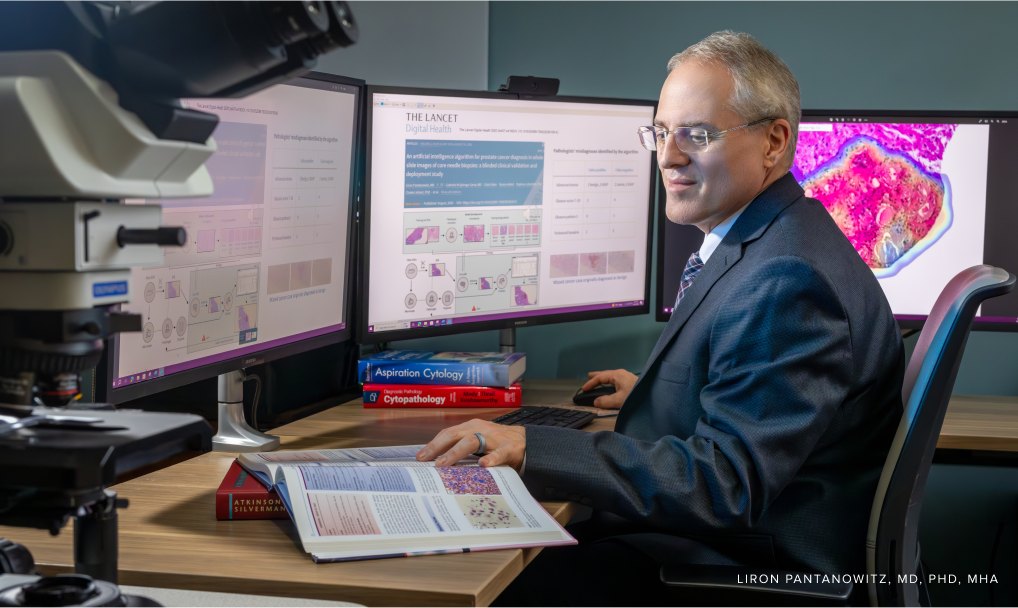“Pathologists are absolutely crucial to good health care,” says Liron Pantanowitz, MD, PhD, MHA, the nationally and internationally renowned leader in digital pathology and informatics who now chairs the University of Pittsburgh’s Department of Pathology. “There’s really not one UPMC patient who does not have an interaction with the path-ology lab.”
Here, the affable Dr. Pantanowitz reveals how pathology, the science of the causes and effects of diseases and injuries, is making health care better and more personal — and why UPMC Shadyside is an epicenter for advances in this vital field.
Why did you come to Pittsburgh?
Aside from the fact that I am a huge Steelers fan and that my family and I really like Pittsburgh, this was a very exciting job offer for me because UPMC has built one of the largest and most interesting pathology departments in the United States. We were one of the very first departments in the United States to become sub-specialized. What that means is that we have, for instance, a group of pathologists who do only head and neck pathology, or another group of neuropathologists who examine only brain tumors and brain lesions.
The advantage for patients is very-high-quality personalized care. In this era of precision medicine, we don’t generalize the diagnoses we make. For example, what cancer do you have? What are the genes and the underlying conditions for your particular cancer? How can we help you get the right drugs to target your cancer?
How can technology help personalize care?
In this department, we are leaders when it comes to using and even inventing technology. For example, we use very advanced molecular testing to help us understand each patient’s disease. We are one of the world’s leaders in advancing digital pathology. For more than a hundred years, pathologists have looked at their cases through a microscope. They have a glass slide with the patient’s tissue or cells on it. They put that under a microscope and look at it. While we still do a lot of that today, we now have technology where you can take that slide, make it into a digital image, and look at it on a computer monitor. UPMC partnered with GE to come up with one of the world’s first digital pathology scanners and systems. And one of my missions here is to go even more and more digital.
What are the advantages of digital pathology?
For one thing, it helps you get world-class care within minutes, no matter where you are. We can get a digitized image quickly from Shadyside to Oakland — or from hospitals anywhere around the world who want to use our expertise.
Does AI have a role in pathology today?
Actually, Shadyside has been a UPMC leader in using artificial intelligence in pathology. We’ve moved into an era of what I will call computational pathology. It’s a fancy word for using computers and artificial intelligence. One example: Shadyside is where we have our Genitourinary (GU) Center of Excellence. GU pathologists here look at prostate biopsies and now use artificial intelligence to screen every biopsy, making sure that we don’t miss or over-call any cancer and to standardize the grading. We’re one of the first centers to be doing that.
I am now hiring data scientists and AI experts to help us open a Computational Pathology and Artificial Intelligence Center of Excellence (CPACE) at Shadyside to take AI to the next level. Right from Shadyside, we’ll be able to change the world!
As UPMC’s chair of pathology, you have based your office at Shadyside. Why is that?
Well, I wanted to be close to Hillman Cancer Center, where a lot of translational pathology happens. I don’t want to be out of touch with that. A lot of what we do as pathologists is cancer work, diagnosing it, following up on it, grading it, and so forth. So I wanted to be right there where the action happens with all the oncologists. And with our AI center, Shadyside will be the epicenter for pathology.
In addition, I wanted to be involved in patient care myself. I practice cytopathology, where we make diagnoses using fine needle aspiration to examine cells from a tumor. I wanted to see patients not only because I enjoy spending time with them and helping them through what can be a tough time but also because I think it gives me better street credibility with my colleagues.
This pandemic and post-pandemic time has been hard for people in health care. I accordingly really would like to make sure that our pathologists have a good work–life balance and that they understand their importance to each patient’s care. And we certainly have the skills to do that.
Can you tell us a little about you?
I grew up in South Africa, studied medicine and pathology there, and then trained at Harvard in anatomical and clinical pathology. UPMC recruited me from Tufts University, and from 2010 to 2020 I became the director of cytology at Shadyside and the vice chair in the Department of Pathology Informatics. I got recruited to the University of Michigan, then in May 2023, I came back to chair the department. My wife and two kids and I all love Pittsburgh — not only for the Steelers but for the diversity and cultural offerings.
My two kids are a delight. My son, Joshua, is super-smart and will be starting medical school next year, and he is also a wonderful pianist. My daughter, Maya, is into musical theater and acting and the arts. She’s studying at the University of Minnesota. She has a beautiful singing voice and could easily be a standup comedienne.
I’m a lucky guy!
